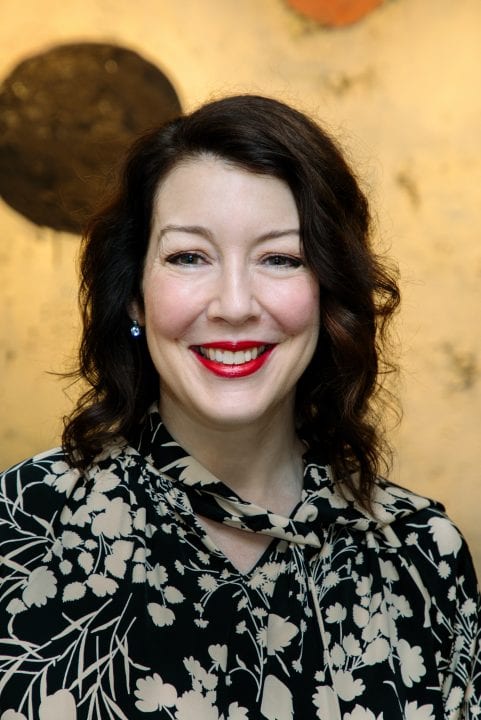
In Darkness, Delight: A Meditation on Tana French
December 8, 2020
In this lovely meditation, SAL Board Member Jennifer Leatherman Wong reflects on falling into the work of a recent SAL author. In this distanced, sanitized, and frightening time, Wong finds comfort in going deep into the dark and the surprising lightness one can find there.
By Jennifer Leatherman Wong
I stumbled on Tana French’s novels as I do many good books, by starting in a bookstore. But this time was different. I was not wandering the bookstore with other book lovers, meandering through tall bookshelves or picking through stacked books on tables, opening to the first page to decide whether or not I wanted to live in this book for a week or two. No creaking wood floors or hushed conversations or whiff of freshly ground espressos wafting from a nearby café.
We were, and still are, in the middle of the pandemic. I was wearing a mask and leaning into the open door on my tiptoes because I so badly wanted to be inside my tiny beloved Madison Park Books. I was thrilled to be out in my neighborhood and somewhere else than the grocery store. A rope and a stool blocked access to the shop, and I had to shout a bit to be heard through my mask, the street traffic, and our proper distance.
“Can I help you find a book,” asked the young man. My heart sank a bit because I did not recognize him. At a disadvantage because I could not find a book myself, I had to rely on him—how many books had this guy read? Did he know every book in his store?
“I’m looking for a mystery,” I said. “Something juicy, something good. An excellent story to get lost in with great characters. But, well-written, you know? A literary mystery. More like, a really great novel.”
He started to peel off some names. Some I knew but some I didn’t. How would we do this? I love historical fiction. I devour it and I write it. I am wrestling with a first draft of an American western told through the eyes of a woman on the Oregon Trail, the longest graveyard in human history. But I was also on a mission. I needed to find a book that would also appeal to the ladies of my book club.
Historical fiction isn’t everyone’s bag. We had been reading serious non-fiction and fiction that tried to explain the contexts of our convulsive times: books by Ta-Nehisi Coates, Carmen Maria Machado, Bryan Stevenson, Isabel Wilkerson, and last month, an RBG book of our choice. But in these dark days we decided to take a break and read a mystery. Something to distract. I didn’t want a pot-boiler with blood, guts, broads, and booze, but a polite and charming mystery or historical mystery read (hello CJ Sansom of my much-loved Matthew Shardlake series!) did not seem to fit the bill either. It had to be literary and contemporary.
“Tana French, then,” he said.
Of course, I recognized her name—she would be featured this fall at our Seattle Arts & Lecture Series. He disappeared from the counter to rifle through a tall bookshelf and came back with a number of her books. He read the titles and I said, yes, yes, and yes from the doorway. It was a little like buying a pig in the poke, but I trust SAL. He handed me the books across the stool, across the bottle of hand sanitizer, across the rope strung across the open door. I tucked them in my bag—and then I fell down the rabbit hole.
Tana French is a novelist whose subject matters are people, passion, and, yes, crime. But hers are no conventional mysteries. They sizzle with intrigue, dialogue, and human truths that pull me up and ask me questions of my own life. Her novels are replete with beauty and lyricism mixed with gritty realism. Here is a sentence from French’s latest novel, The Searcher, that I loved: “He appreciates mornings not for their effect on him, but for themselves. Even smack in the middle of a temperamental Chicago neighborhood, dawn sounds rose up with a startling delicacy, and the air had a lemony, clean-scoured tinge that made you breathe deeper and wider. Here, the first light spreads across the fields like something holy is happening, striking sparks off a million dewdrops and turning the spiderwebs on the hedge to rainbows; mist curls off the grass, and the first calls of birds and sheep seem to arc effortless miles.”
And then this, from The Likeness: “Some people are little Chernobyls, shimmering with silent, spreading poison: get anywhere near them and every breath you take will wreck you from the inside out.”
And this, from The Likeness, pulled me up short: “I wanted to tell her that being loved is a talent, too, that it takes as much guts and as much work as loving; that some people, for whatever reason, never learn the knack.”
Tana’s novels explore ill-considered choices made by people we can very nearly sympathize with; her characters—the so-called good guys and the so-called bad guys—are people like us, and the consequences follow with sure-footed aplomb, honesty, and also compassion. Perhaps that is the real reason we read books. I read for pleasure, distraction, and adventure – “there is no frigate like a book,” as Emily Dickinson so beautifully wrote—but underneath my joy in story, juicy characters, and sumptuous language, I am also searching for meaning. For a way to make sense of life. It’s a kind of hope, I think. A belief that there is a narrative to be made out of our own life’s events just as story is created out of the lives of the characters we fall in love with and remember long after the book has closed.
Tana’s novels entertain with strong characters, vivid language, and haunting crime scenes. Here is an intriguing sentence from The Likeness: “If you’ve seen a dead body, you know how they change the air: that huge silence, the absence strong as a black hole, time stopped and molecules frozen around the still thing that’s learned the final secret, the one he can never tell. Murder victims are different; they don’t come alone. The silence rises up to a deafening shout and the air is streaked and hand-printed, the body smokes with the brand of that other person grabbing you just as hard: the killer.”
While we have spent and will continue to spend so much of our time trying to keep ourselves and our loved ones safe from this rampaging world-wide pandemic, reading crime novels that chill our hearts may seem paradoxical. But in choosing to read about things the frighten us, in small doses every night, we come away with a feeling that in the end, monsters can be defeated.
In this Seattle fall and coming winter, we will begin our mornings in darkness. It will return, each day, too soon, without a commute from work or a drive to pick up the kids, to mark the onset of darkness. I hope you have a feast of good books to keep you company and light your way, and I hope you find delight in darkness, too.
 When not doing work for the SAL Board (and in non-COVID times), Jennifer Leatherman Wong can be found writing and researching her historical novel set in the 1850s; volunteering at her children’s school, the Seattle Academy of Arts & Sciences, and Saint Mark’s Episcopal Cathedral; attending basketball, soccer, track, and ultimate frisbee games, high school musicals and dance recitals; walking her darling French Bulldog, Hugo; haunting antique shops; and reading, always reading. She is originally from the land of lush fields, thunderstorms, and dark woods of Northwest Ohio.
When not doing work for the SAL Board (and in non-COVID times), Jennifer Leatherman Wong can be found writing and researching her historical novel set in the 1850s; volunteering at her children’s school, the Seattle Academy of Arts & Sciences, and Saint Mark’s Episcopal Cathedral; attending basketball, soccer, track, and ultimate frisbee games, high school musicals and dance recitals; walking her darling French Bulldog, Hugo; haunting antique shops; and reading, always reading. She is originally from the land of lush fields, thunderstorms, and dark woods of Northwest Ohio.